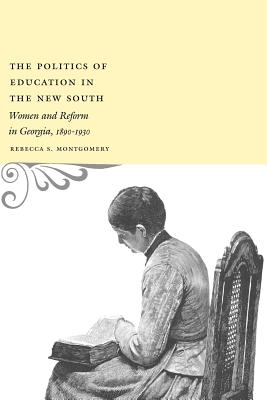Alarmed at the growing poverty, illiteracy, class strife, and vulnerability of women after the upheavals of Reconstruction, female activists in Georgia advocated a fair and just system of education as a way of providing economic opportunity for women and the rural and urban poor. Their focus on educational reform transfigured private and public social relations in the New South, as Rebecca S. Montgomery details in this expansive study. The Politics of Education in the New South provides the most complete picture of women's role in expanding the democratic promise of education in the South and reveals how concern about their own status motivated these women to push for reform on behalf of others. Montgomery argues that women's prolonged campaign for educational improvements reflected their concern for distributing public resources more equitably. Middle-class white women in Georgia recognized the crippling effects of discrimination and state inaction, which they came to understand in terms of both gender and class. They subsequently pushed for admission of women to Georgia's state colleges and universities and for rural school improvement, home extension services, public kindergartens, child labor reforms, and the establishment of female-run boarding schools in the mountains of North Georgia. In the process, a distinct female political culture developed that directly opposed the individualism, corruption, and short-sightedness that plagued formal politics in the New South.
| FindBook |
有 1 項符合
The Politics of Education in the New South: Women and Reform in Georgia, 1890-1930的圖書 |
 |
The Politics of Education in the New South: Women and Reform in Georgia, 1890-1930 作者:Montgomery 出版社:LSU Press 出版日期:2008-08-01 語言:英文 規格:平裝 / 272頁 / 22.9 x 15.2 x 1.5 cm / 普通級 |
| 圖書館借閱 |
| 國家圖書館 | 全國圖書書目資訊網 | 國立公共資訊圖書館 | 電子書服務平台 | MetaCat 跨館整合查詢 |
| 臺北市立圖書館 | 新北市立圖書館 | 基隆市公共圖書館 | 桃園市立圖書館 | 新竹縣公共圖書館 |
| 苗栗縣立圖書館 | 臺中市立圖書館 | 彰化縣公共圖書館 | 南投縣文化局 | 雲林縣公共圖書館 |
| 嘉義縣圖書館 | 臺南市立圖書館 | 高雄市立圖書館 | 屏東縣公共圖書館 | 宜蘭縣公共圖書館 |
| 花蓮縣文化局 | 臺東縣文化處 |
|
|
圖書介紹 - 資料來源:博客來 評分:
圖書名稱:The Politics of Education in the New South: Women and Reform in Georgia, 1890-1930
|











